The streaming era might’ve gifted us all with an endless flood of addictive, prestige-y scripted content, but sometimes, all we want is to kick back and relax with some reality TV. At a time when real life can be so exhausting, diving into this genre’s uncanny valley offers a special kind of reprieve. But where do you even begin — with classics like Survivor and Big Brother and The Real World, or with hot newcomers like Love Is Blind and Selling Sunset? Do docuseries count? (For the record, yes — but also, it depends!) And which K-reality is worth watching?
Never fear, newbies. As someone who has been hooked on reality since before many of its current stars were even born, I’ve curated a list of all the best offerings available to stream on Netflix. We’ll keep this list updated as titles come and go, and in the meantime, you’ll notice they’ve all been broken out into distinct categories to help you pick based on your specific interests. Enjoy — and don’t forget to take a break once in a while to eat, sleep, and, you know, live your own life.
These games can feature a mixture of physical and mental challenges and prize strategy above all else.
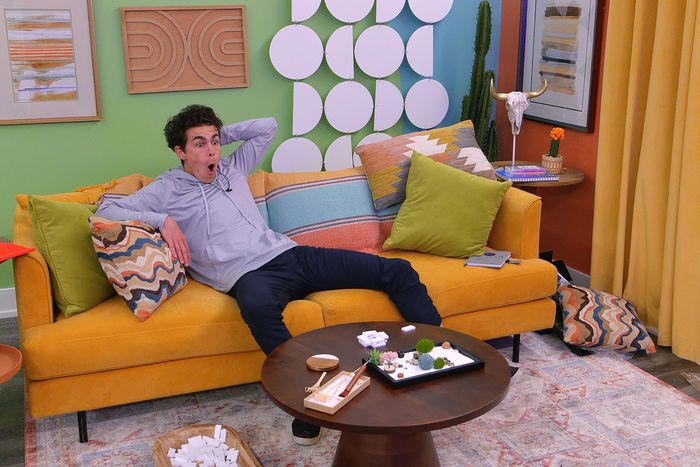
This chat-based popularity contest (a Netflix original) has no right being as fun as it is. The players each isolate in a cheerfully decorated apartment and communicate solely through “The Circle” as they try to rise in the rankings either by being themselves or catfishing as someone else. The most popular players become “Influencers” and control who goes home. Every season, I think I can’t stand anyone in the cast, but by the end, they never fail to win me over.
Before we had The Circle, we had this Orwellian masterpiece from CBS. In Big Brother, based on a Dutch-TV format, a group of competitors live together in a house that’s chock-full of cameras and microphones that constantly record them. They vote one another out one by one, and in the end, the final players must convince a jury of their eliminated peers why they deserve to win. Only seasons six and 17 are available on Netflix right now, but the good news is that both are excellent.
By all accounts, this bonkers show should not exist. It re-creates the gruesome, playground-themed games seen in Netflix’s 2021 Korean hit, Squid Game, along with the original show’s epic scale. (We start out with 456 players in total.) There’s a bleak irony to all of this as well: The original show was a critique of capitalism, and the real-life version’s astronomical cash prize is a stark reminder of just how much cash Netflix is sitting on. Shouldn’t we be sending it to, like, a charity or something?
Unfortunately, this show is just so damn good — even down to the macabre humor of having players “die” when they lose, just like they did for real in the original. You haven’t lived until you’ve seen grown-ass adults yelling at each other over a game of marbles.
At this point, Survivor probably doesn’t require explanation. Come for the survivalist Schadenfreude and stay for the stunning blindsides. Season seven is significant because of who wins (no spoilers), while 33 had a fun but divisive theme: “Millennials vs. Gen X.”
We simply love a show that’s all about sabotage. In this show, originally hosted by Anderson Cooper in a leather jacket on ABC, a group of players complete a series of globe-trotting challenges (physical and mental) to add money to a collective prize pot. Among them is a “mole,” whose sole mission is to go undetected while screwing up their efforts as much as possible. Each week, players take a quiz about the mole’s personal background, and whoever is the furthest off-base goes home. In the end, the mole is unmasked, and the player who gets the most right about them wins.
Netflix has picked this show up where ABC left off, and although Cooper has not returned, MSNBC’s Alex Wagner and NPR host Ari Shapiro have both done a fine job turning up the snark in their respective seasons. Netflix does not have the ABC seasons, but just like our replacement hosts, the two originals it has produced so far fully recapture the old spirit.
Wise men say only fools rush in, but luckily for us, there’s never been a shortage of brave souls willing to risk it all in the hopes of finding love on TV.

Netflix’s first viral dating show, LIB is the stuff of legend for a reason. It’s the perfect mixture of romance, cringe, and utter absurdity. The show starts off in the “pods,” where dozens of singles date without seeing one another’s faces, before eventually getting engaged sight unseen. After a “reveal,” they jet off for a honeymoon phase before trying out cohabitation. In the end, they decide if they want to get married for real, and, then, we reunite with them a year later to see who’s still together and who’s broken up. Longtime viewers of this show have seen it all: toilet flies, a concerning argument about Cuties, and countless couples who seem like endgame until one of them gets the ick. It’s emotional! It’s messy! And it’s the exact kind of guilty pleasure you hit “play” on immediately the moment it hits your queue.
Leave it to the evil geniuses at Kinetic Content to look at a chaotic psychological experiment like Love Is Blind, rub their hands together, and say, “This is great, but we can do better.” On The Ultimatum, couples who are at odds over whether or not to get engaged swap partners for three-week “trial marriages” before switching back to their original partners for another three weeks of mock matrimony. In the end, they must decide if they want to leave the show engaged to their original partners, break up, or continue dating their new partners. The results are usually as explosive as you’d expect, which is why, unfortunately, I’ll never be able to skip a season.
In this delightfully vapid British masterpiece, a gaggle of hot, horny singles gather at a luxe villa where they’re forbidden from any kind of sexual contact — with one another or themselves. For everyone who breaks the rules, money leaves the group prize pot. That’s it! That’s the whole show! Sure, there are some workshops where these shallow Hals and Hallies try to wOrK oN tHeMsElvEs, but for the most part, it’s just hot people hanging out and complaining about how hard it is not to hook up. Where’s David Attenborough when you need him?
If you thought Love Is Blind worked on a condensed timetable, wait till you see Married at First Sight (also from Kinetic Content), in which singles looking for a lifelong commitment get paired up by experts and live for eight weeks in arranged marriages before deciding if they want to stay together or get divorced. As absurd as this sounds, the show’s got a success rate of 17 percent — which isn’t amazing but is also certainly better than what I’d expect for two strangers who got married on TV before exchanging a single word. Seasons 14 and 15, the only ones available on Netflix, are not exactly romantic masterpieces, but if you’re looking for drama, you’ve come to the right place.
This one’s like the Avengers of Netflix reality shows — the one that gathers all the hottest hotties from all your favorite shows (and a few you’ve never heard of, like The Trust) and gets them together to all be hot in one hot tropical mansion. This is one of those romantic musical-chairs situations in which couples pair off and try to keep one another interested while other sexpots cycle through the house and try to split up the power pairs. Each week tests these relationships with challenges, and the “strongest” “couple” wins in the end. (I use those quotes because if you watched season two, you know that’s not at all what happened, but that’s so not the real point of this show, so I did not care!)
You don’t have to be a chef yourself to enjoy the sight of folks who are way better at cooking than you’ll ever be preparing dishes you could never hope to make.
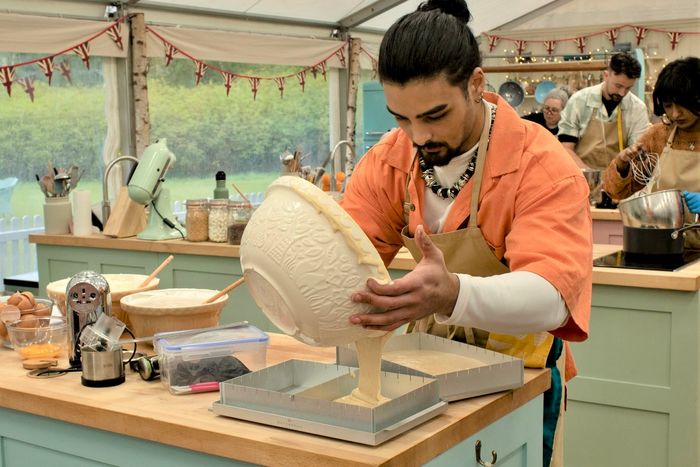
The healing power of this magical show cannot be overstated. From the plinky-plunky music, to the gentle competitiveness, to the charming mock-up illustrations of delicious baked goods, every layer of this sweet confection was designed to soothe. The concept is simple: Amateur bakers gather and compete to impress two judges with their recipes and technical skills. Each week, the judges pick a Star Baker, and in the end, they declare an overall winner. This is more than a baking show; it’s a cleansing ritual.
Basically the opposite of The Great British Baking Show, the pleasure of watching Nailed It! is to see terrible bakers absolutely fail — and have a great time doing it. The assignments are elaborate, the skill level is through the floor, and host Nicole Byer is there to keep us all laughing. There’s just something about watching food judges suffer that makes for remarkable TV — and, in the end, someone walks away with a $10,000 cash prize. God willing, Byer and her money gun will keep entertaining us for years and years to come.
As much as I wish Netflix was able to license more seasons of Bravo’s culinary-television juggernaut, the two seasons it does have are both outstanding. Season six, set in Las Vegas, won the show its first (and so far only) Emmy for Outstanding Reality Competition Program, while 15, set in Colorado, features a winner with a compelling redemption arc — a surefire recipe for crowd-pleasing TV.
As stadium cooking shows get weirder and weirder, Pressure Cooker adds a social element: The chefs don’t just compete in a series of cooking challenges, they also live together, wash the dishes together, and (blindly) judge one another’s cooking. Is this setup just a cheap way to get out of hiring judges, just like it replaces the traditional role of host with a receipt printer that gives chefs their next challenge? Perhaps! But regardless, it successfully adds a new, fascinating wrinkle to the competition.
Although Netflix does not have the original Iron Chef or Iron Chef America, it does have the next best thing: a reboot that once again stars Alton Brown as Kitchen Stadium host and Mark Dacascos as its Chairman. Sadly, Netflix’s iteration is a bit tamer and less wacky than the original, but the food is just as impressive.
The houses are huge on these shows, and yet the interpersonal drama still upstages them every time.
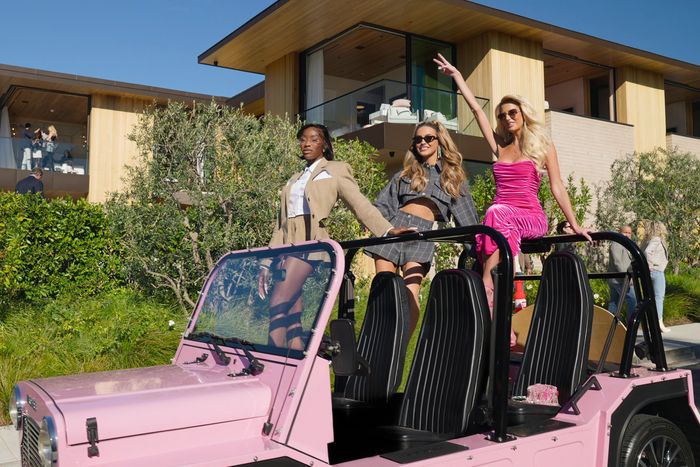
Photo: Netflix
Ah, the ridiculous show that started it all. Sky-high stilettos meet gorgeous, expansive vistas in this glossy ode to excess. Twins Jason and Brett Oppenheim run the posh L.A. brokerage the Oppenheim Group, which seems to only employ model-esque women with a penchant for personal drama. If you like your real-estate porn with a super-sudsy side of soap (and some seriously ostentatious fashion choices), you’ll ride off into the horizon with this one and never look back.
If you watched Selling Sunset and thought, Gee, I wish everything and everyone in this show had found a way to seem even more artificial, have I got a show for you! Follow Jason Oppenheim sans Brett out to Newport Beach, where the clothes are somehow even more inappropriate and the in-office spats are even more brutal. But be warned: This is trash TV at its most ridiculous.
This one’s got a Real Housewives tie-in thanks to real-estate broker and the Agency owner Mauricio Umansky, a.k.a. Real Housewives of Beverly Hills star Kyle Richards’s estranged husband. This show fills in a lot of RHOBH blanks, making it essential viewing for any obsessive, but newcomers who don’t care about Housewives need not fear: the interpersonal turmoil is not too difficult to follow. Unfortunately, this one got canceled earlier this year after two seasons.
I’m convinced that real-estate mogul Ryan Serhant was genetically engineered to be on real-estate reality TV. He’s the perfect blend of telegenic, self-important, and money hungry — the kind of boss who has everyone write their biggest sales on a wall to inspire competition. Watching him run all-hands meetings is like watching outtakes from The Wolf of Wall Street, and I’m not convinced that the resemblance is unintentional. If you happen to be a New Yorker, this show also comes with a healthy side dish of absolute, incandescent, gentrification-fueled rage.
No gimmicks — just real people going through something.
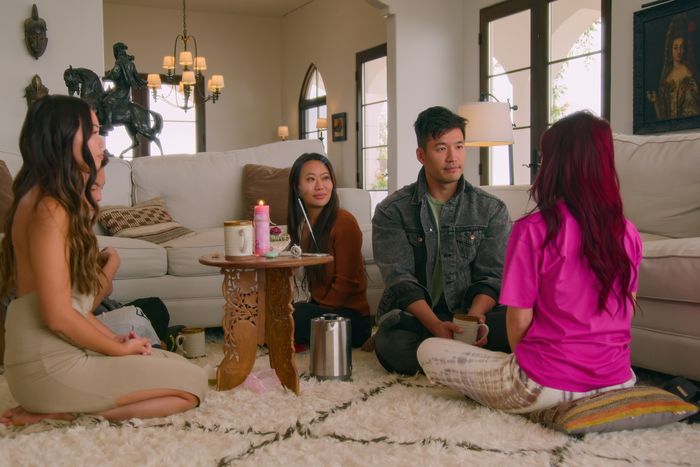
Photo: Netflix
If you’re looking for a change of pace from the typical reality shows on Netflix, this is the one to check out. Terrace House is a Real World–esque fishbowl show from Japan with a fascinating twist: In addition to its primary cast, the show features interstitials with commentators who analyze and theorize about their behavior. The show might be a bit less naturalistic than Netflix’s U.S. translation and its comparatively more subdued music imply, but no matter what draws you in, you’ll be hooked in no time.
Speaking of the original Real World, Netflix has two seasons of the MTV phenomenon to offer. Although seasons nine and 16 are only, like, fine, any season of The Real World is revealing in its own way — a cultural artifact of the time. That’s especially true of season nine, which aired in 2000. Cast member Danny Roberts helped define queer representation by coming out to his roommates and brought attention to Don’t Ask, Don’t Tell when the show blurred out the face of a U.S. Army captain he was dating. Austin was perhaps more messy than historic, but you know what? Sometimes that’s fun, too!
One could technically call this a reality dating show, but it’s not a gimmick-driven psychological experiment like the genre’s most popular entries. Instead, this Australian program follows singles on the spectrum as they go on a series of blind dates in the hopes of finding love. As they meet with a dating coach, it becomes clear how universal the struggles of dating truly are — from coming up with things to say to a stranger, to maintaining eye contact, to deciding if the chemistry is really there. Even better, the docuseries also includes an absolutely heart-melting established couple, Jimmy and Sharnae, who navigate a more advanced, equally relatable set of challenges.
Marie Kondo’s decluttering method might be controversial, but this gentle series showcases the emotional logic behind it. It’s not about throwing everything away, but about letting go of needless junk to better see and appreciate the things (tangible and intangible) that really matter. In each episode, Kondo guides a person or family through the process and helps them honor all of the feelings that arise along the way. Even if cleaning content isn’t your thing, it’ll at least inspire a Sunday cleaning spree.
Basically IRL Crazy Rich Asians, Bling Empire shows us the wild lives of its fantastically wealthy, L.A.-dwelling Asian cast — which includes real-estate progeny, tech moguls, plastic surgeons, and the daughter of a purported arms dealer. You know, as is typical of any social group! If you enjoy watching rich people do rich-people things like shop, party in megamansions, and gossip about their equally wealthy friends, don’t pass this one up.
If you loved the high concept and massive scale that fueled Squid Game: The Challenge, it’s time to give these wild, equally ambitious shows a try.

A hard-body competition whose scale almost approaches Squid Game, Physical: 100 is a South Korean series on the hunt for the ideal physique. One hundred athletic types gather for a tournament that tests their strength, balance, agility, and more. The sole winner collects a cash prize, and each time someone loses, they have to smash a plaster cast of their body — a dramatic flourish that I wish more shows would replicate.
While Physical: 100 is all about the body, The Devil’s Plan tests competitors’ minds through a series of brain games. Win a game and you collect gold coins. Lose all your gold coins, and you get eliminated. The last person standing wins the whole thing. A cousin to games like The Traitors and The Mole, this one pivots on alliances. If you like the idea of watching people get so invested in childhood games that they cry, this might just tide you over until the next Traitors season.
The beauty of Single’s Inferno is its simplicity: Gorgeous singles meet on an island in the hopes of finding love. They can’t share their ages or occupations until they pair up with someone else and take a helicopter to a luxury escape. As with Terrace House, we also have a second layer of personalities beyond the main cast: four hosts who gab about season highlights and big personalities. The title might sound intense, but it’s a hell of a lot less bonkers than any Stateside production. How refreshing to watch a dating show where the only requirement is … dating!
This attention-seeking battle of the personal brands is exactly what its title implies: a popularity contest in which 77 real-life influencers duke it out for clout (both online and with one another). This show’s got makeup artists, musicians, and even a shaman, and all of them are out to grab eyeballs by whatever means necessary — partially because they have to wear a collar that displays their follower count, which the show translates into their dollar-figure value. Who needs self-esteem when you can go home with a big, fat cash prize?
This cooking show is overwhelming at first — we start out with a whopping one hundred chefs in total — but over time, the fascinating concept wins out. Here, 80 no-name chefs show up to compete before learning that for 60 of them, the journey will end before it even starts in earnest. The goal is to make it far enough to compete against 20 famous chefs, all of whom have accolades like Michelin stars and culinary awards or have won a cooking competition before. If you can wrap your head around the dizzying number of contestants, it’s a tasty dish.
As someone who’d rather gnaw her own arm off than watch a full game of football (or tennis or basketball or, or, or …), I’d still give each of these a ringing endorsement.
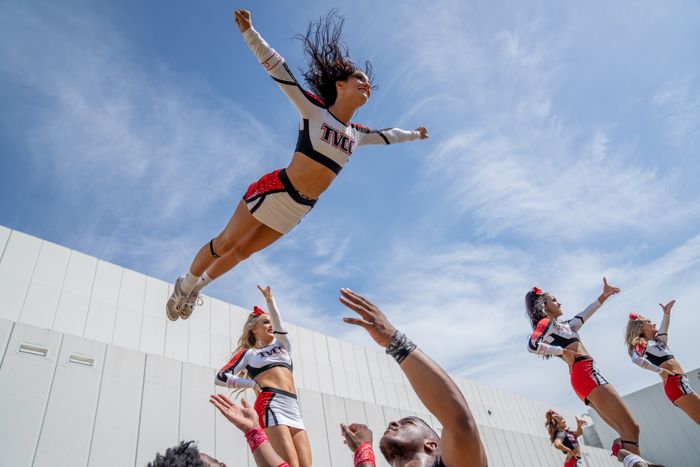
This cheerleading docuseries had us all hooked in 2020, and the horrifying real-life scandal that emerged in its wake made for an even deeper second season. The first season followed the competitive cheerleaders of Navarro College, while the second season examined the effects of their instant celebrity as well as the indictment of its biggest breakout star, Jerry Harris.
An artful and heartfelt examination of team-building, Last Chance U transports viewers into the scrappy world of community college football. (Its equally accomplished offshoot, Last Chance U Basketball, does the same thing with hoops.) As the title suggests, this athletic rung is often the last chance for NCAA potentials who didn’t quite make the cut at four-year colleges, and it spins their personal journeys into poetic elegies about success, failure, and, most important, the effort everyone puts in between games.
Ah, yes — the show that got us all hooked on F1. The series goes inside ten teams, giving us the dirt on their rivalries and Big Personalities™. Along the way, it exposes the petty vanities and jockish competition between adult men — revealing in the process that this brand of immature controversy is not just the purview of bored housewives.
Produced by the same team as Drive to Survive, this show aims to do for tennis what that show did for F1. We follow several up-and-coming players and top pros, like Taylor Fritz, through their entire pre- and post-game routines, and in the process, we learn what makes them tick. The doc’s rosy portrayal of Nick Kyrgios does not age well in light of the assault allegations leveled against him later, but on the whole, its perspective is valuable to anyone looking to understand this sport and its players a little better.
Break Point and F1 producer Box to Box also made this PGA golf documentary. (Could pickleball be next? Because that’s the sports craze I really need help understanding.) Spend the season with figures like Jordan Spieth and Justin “JT” Thomas, whose long-running professional rivalry gives the first episode its title — “Frenemies.” PGA broadcaster Amanda Renner also provides helpful information for those of us whose only golf experience until now has involved colorful clubs and a big plywood windmill. By the end of this series, you’ll be saying, “Tiger who?”
Cartwheel into the world of the biggest brand in NFL cheerleading, and you will discover an intoxicating cocktail of unbridled passion and borderline-impossible standards. This isn’t just about cheerleading: It’s about capitalism, about femininity, about America and what its self-image reveals about its values. In other words, even if you could not give less of a damn about football, there’s a good chance it could still speak your language.
Netflix partnered with the NFL to make this series, so as with many of its “documentary” projects, don’t expect too much objectivity. Kansas City Chiefs quarterback Patrick Mahomes is a central star, and his production company, 2PM Productions, produces the series. Alongside Mahomes, Quarterback’s main characters are Atlanta Falcons quarterback Marcus Mariota and the Minnesota Vikings’ Kirk Cousins. In exchange for unprecedented access, we get a glossy, somewhat generic portrayal of all three men.
These glamorous shows will have you catwalk-ready in no time.
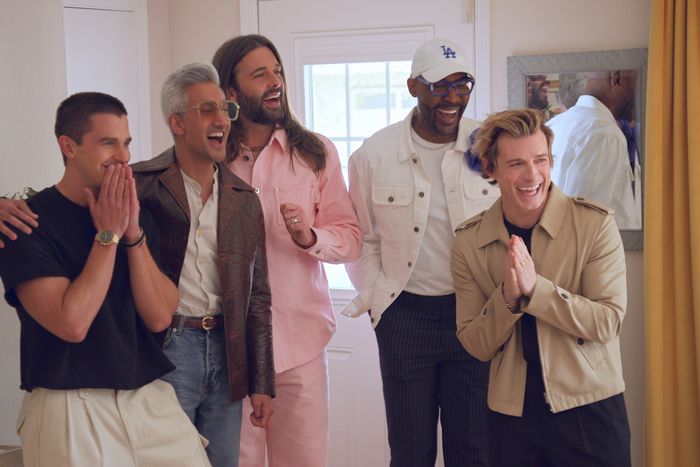
If only every season of this fantastic design competition were available on Netflix. But, hey — some is better than none! Season 17 was a big shift for the show: It was here when season-four winner Christian Siriano stepped up to replace Tim Gunn as a designer mentor, while Karlie Kloss replaced Heidi Klum as a host and judge, and Brandon Maxwell took over for Zac Posen. Although some of the new personalities hit the ground running faster than others, Siriano, in particular, shined bright and proved that, sometimes, a refresh can serve a beloved TV show well.
Netflix’s reboot of the early-aughts life-makeover show is bubblier than its predecessor and turned its stars, Jonathan Van Ness, Tan France, Antoni Porowski, Karamo Brown, and Bobby Berk, into household names. (Jeremiah Brent will step in after Berk’s exit to take over home design in season nine.) This is peak feel-good TV: The guys show up and help fine-tune their clients’ grooming, fashion, culinary skills, life habits, and homes. Who wouldn’t love a little free TLC?
Think of this as The Great British Baking Show but for makeup lovers. Here, ten makeup artists compete for the approval of two permanent judges — L’Oréal Paris global makeup director Val Garland and M.A.C Cosmetics global senior artist Dominic Skinner — as well as one rotating judge. Challenges range from circus makeup to runway looks, and as with Baking Show, the vibe skews more easygoing than cutthroat.
This show could’ve easily lived among the other docuseries, but its central figure, Julia Haart, also happens to be chief executive of the titanic modeling agency Elite World Group. Part fascinating culture study of an ex-Orthodox Jewish woman and her family and part Bravo-style soap, this strange show lives at the nexus of authenticity and contrivance. On one hand, it offers a unique window into a family whose religious views fall all the way across the spectrum, and on the other, it often unfolds like typical mansion slop. As uneven as this exploration might be, it would be tough to argue that it isn’t interesting.
Tan France and Gigi Hadid (and, previously, model-slash-TV presenter Alexa Chung) unite as hosts of this Netflix fashion-design competition. The sheer talent on display here is staggering, which makes sense, given that the prize is a hefty $250,000 sponsorship and the chance to launch a collection through Net-a-Porter. There’s a more workmanlike approach to this series than many; sure, there’s drama, but there’s also discussion of, like, sustainability and fashion’s narrow body standards. Add in affable turns from our hosts, and you’ve got a pattern sure to deliver success.
